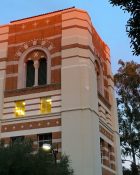
Amanda Hust

Colloquy Editor
Amanda Hust completed her undergraduate degree in Philosophy in 2018 and won the Kalish Prize that year. She is pursing her masters degree at UCLA's Teacher Education Program.
CE: What have you done since you graduated from UCLA?
CE: How did you get interested in philosophy?
important and interesting to dissect them. One complexity that intrigued me from the very beginning is the idea that there’s almost never one “right” or true answer to any one philosophical inquiry. However, I realized what philosophy does is allow us to refine, improve, and modify the answers we come up with in order to get closer to the truth or at least get a better grip on what we might be looking for. Since Tm very interested in finding out what is true about the world and what we can do with these truths, I pursued philosophy.
CE: How do you use your philosophy degree in your current pursuits?
Also, practicing philosophy has inspired a belief! have about the purpose of life, transparent in my work as a social justice educator. I personally believe that the purpose of life is to be a good person. To fulfill this purpose, I evaluate myself at the end of the day. I ask myself, “Amanda, were you a good person today?” Coming up with a substantial response to this question requires me to figure out what it means to be a good person.
Before entering my graduate program, I had developed what I thought was a pretty solid definition of what I think it means to be a good person, which is Aristotelian-inspired, namely to consistently and actively practice virtues within a community such as kindness, courage, wisdom, honesty, empathy, and most importantly, justice.
The question I ask myself now has been refined: “Amanda, were you kind to people in your community today? Were you honest to others? Were you being just?” I have working definitions for each of these virtues but the one I’m focused on right now is justice. If l want to be a social justice educator, I had better figure out what it means to be just and promote a just society. To me, justice has been one of the hardest virtues to define. Plato wrote an entire book about it and many other philosophers talk about it in great detail. After being in my graduate program, I’ve been able to use philosophy and what I’m learning to flesh out my own definition of justice from my initial starting point that justice places conditions on individuals and communities to be fair, impartial, and moral. From my graduate experiences, I quickly learned that to be fair, you have to understand the lives of the individuals in your community and where they come from. If a stranger walked into my classroom and they saw me giving the leftover breakfast burritos to only one student, they might think this is not fair. But if they learned that this student lives in a car with his mom, this stranger might change their mind. To be impartial doesn’t merely mean to be neutral but also to check your unconscious biases. That is, to become aware of the judgments you’re making on a daily basis and to transform these judgments as you become aware of them. As a teacher, being moral requires that I respect the dignity of each human being by giving everyone an equal opportunity to not only voice their ideas about what they’re experiencing but also to make changes based on this information. As I teach from this perspective I find that I am not only creating a space to heal but I am also able to hear, see, and value my students in a fruitful way, which I believe is an innate desire we have as human beings.
Do not try and argue that something is true merely because you believe it is true. Argue that something is true because there is a good reason to believe it is true. Use logic!
CE: What you recommend to undergraduates to get the most out of UCLA and your philosophy degree?
- Get to know your professors as philosophers and as people! The philosophy professors are some of the most kind hearted intellectuals I’ve ever known. I have zero doubt that getting to know them will be an invaluable experience.
- Do not get discouraged if you can’t understand something. Philosophical questions can be difficult to tackle and even harder to understand at times.
- Allow yourself to change your mind. A lot.
- Do not try and argue that something is true merely because you believe it is true. Argue that something is true because there is good reason to believe it is true. Use logic!

